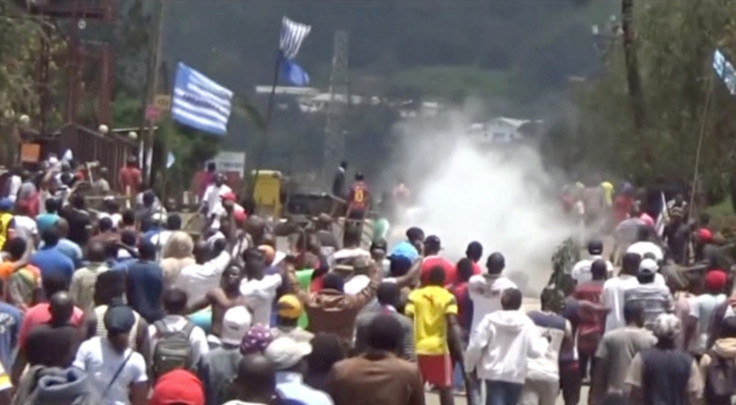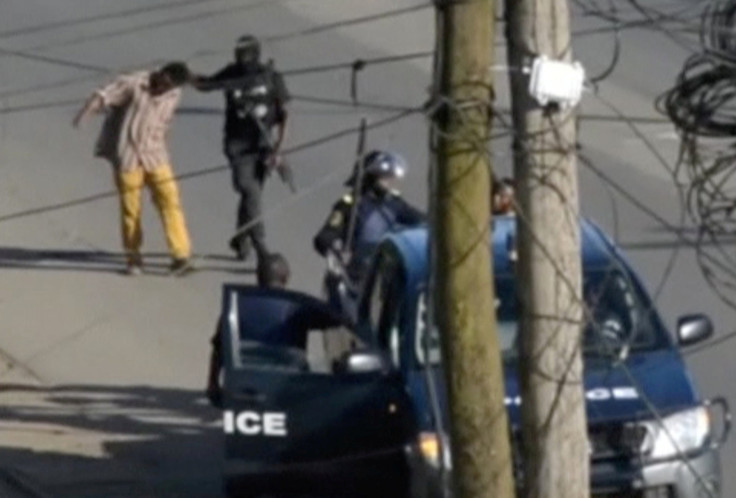Video allegedly shows Cameroon soldiers dragging and beating protesters amid deadly rallies
Groups have been protesting and striking as they call for the independence of Cameroon's English provinces.
Footage has emerged showing what appear to be Cameroonian soldiers dragging and hitting a protester during demonstrations held in the Northwest and Southwest Regions, the country's only English-speaking areas.
The incident took place in Bamenda, capital of the Northwest Region, on Sunday 1 October, sources told IBTimes UK, which could not independently verify the authenticity of the footage.
The video surfaced in the wake of a report by rights group Amnesty International claiming that security forces killed at least 17 people during pro-independence demonstrations on 1 October.
The protests coincided with the 56th anniversary of the incorporation of Anglophone regions into Cameroon.
Amid rising tensions in the English zones, groups have taken to the streets demanding a return to a federal state system, the breakaway of the two provinces and the restoration of Southern Cameroons, also known as the Republic of Ambazonia. Southern Cameroons was the southern part of the British Mandate territory of Cameroons during colonisation.
Reports claimed that at least a dozen people were killed, some shot by military helicopters, while at least 40 others were arrested, AP said, quoting local media. Six soldiers were attacked during the rallies.
Ilaria Allegrozzi, Amnesty International's Lake Chad researcher, told IBTimes UK that most of the protesters were "shot by security forces as they marched and attempted to host the Ambazonia flags in parts of the cities during protest".
"[Some] protesters were reported to use violence, but not to have been armed with guns. We documented peaceful protests overall," she continued.
"Excessive use of force to manage crowds is not justified. "Amnesty calls on Cameroonian authorities to investigate the use of excessive and unnecessary force and refrain from the use of unlawful force."
Social media platforms such as WhatsApp were blocked in the English-speaking regions and residents expressed fear about restrictions imposed by the government, AP reported.
In the capital Yaounde and all major towns in the French-speaking regions, political parties, lawmakers and the government organised rallies denouncing the separatist groups.
Cameroon Protests explained

In 1961, people of Southern Cameroons voted whether to join Nigeria or the Republic of Cameroon, which had already obtained independence from Britain and France one year earlier. The vote resulted in Southern Cameroons becoming part of the French speaking Republic of Cameroon.
In 1972, a new constitution was adopted in Cameroon, replacing the federal state with a unitary state.
French and English are the official languages of Cameroon. Lawyers, teachers and students in the English-speaking areas have been striking since October 2016 against perceived marginalisation, the use of French in courts and schools in the provinces, and the lack of English versions of some legal acts and codes.
"While working to practically respond to some of the real or perceived grievances of marginalisation, discrimination and frustration raised, the state has to work on a well structured and coordinated strategic communication with key but untainted government and private officials who will not add fuel to the fire," UK-based security analyst David Otto told IBTimes UK.
He added that the use of social media played a significant factor in helping demonstrators organising rallies and strikes.
"The government did not envisage the power of an active diaspora with financial and technical potential to influence behaviour and effect direct change at home" said Otto, who frequently travels to Cameroon for his work.
"This crisis requires a very proactive engagement with the concerned people and those they trust to represent their voice."
Cameroon government position

Cameroonian authorities have been accused of using excessive force to quell rallies, amid claims some protesters had been killed during previous demonstrations . The government has denied the allegations.
The High Commission of Cameroon in London has not responded to an IBTimes UK request for a comment on Amnesty's report and allegations of excessive force.
The Cameroonian government has rejected calls for a referendum on federalism and has blamed secessionist groups for recent attacks in Bamenda.
The Minister of Territorial Administration said in a statement that "all activities, meetings and demonstrations initiated or promoted by the Southern Cameroons National Council (SCNC), the Cameroon Anglophone Civil Society Consortium (CACSC), any other related groups with similar objectives or by anyone partisan to these groups, are hereby prohibited all over the national territory".
Earlier this month, President Paul Biya ordered the release of dozens of activists. The president also instructed a military court to drop charges against those arrested during protests.
However, other activists, including radio broadcaster Mancho Bibixy, remain in jail, Reuters reported. Bibixy is accused of threatening the the integrity of the nation by calling for the breakway of English-speaking regions.
© Copyright IBTimes 2025. All rights reserved.






















